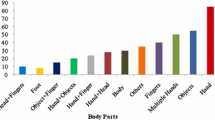Abstract
We report a series of empirical studies investigating gesture as an interaction technique in pervasive computing. In our first study, participants generated gestures for given tasks and from these we identified archetypal common gestures. Furthermore, we discovered that many of these user-generated gestures were performed in 3D. We implemented a computer vision based 3D gesture recognition system and applied it in a further study in which participants used the common gestures generated in the first study. We investigated the trade off between system performance and human performance and preferences, deriving design recommendations. We achieved 84% recognition accuracy by our prototype 3D gesture recognition system after tuning it through the use of simple heuristics. The most popular gestures from Study 1 were regarded by participants in Study 2 as best matching the task they represented, and they produced the fewest recall errors.
Access this chapter
Tax calculation will be finalised at checkout
Purchases are for personal use only
Preview
Unable to display preview. Download preview PDF.
Similar content being viewed by others
References
Accord_Statistics_Library, http://www.crsouza.com
Kendon, A.: Current Issues in the Study of Gesture. In: The Biological Foundations of Gestures: Motor and Semiotic Aspects, pp. 23–47. Lawrence Erlbaum, Mahwah (1986)
Ramamoorthy, A., Vaswani, N., Chaudhury, S., Banerjee, S.: Recognition of Dynamic Hand Gestures. Pattern Recognition 36(9), 2069–2081 (2003)
Keskin, C., Erkan, A., Akarun, L.: Real Time Hand Tracking and 3D Gesture Recognition for Interactive Interfaces using HMM. In: ICANN/ICONIPP 2003, pp. 26–29 (2003)
Kray, C., Nesbitt, D., Dawson, J., Rohs, M.: User-Defined Gestures for Connecting Mobile Phones, Public Displays and Tabletops. In: MobileHCI 2010, pp. 239–248 (2010)
Efron, D.: Gesture and Environment. Morningside Heights. King’s Crown Press, New York (1941)
McNeill, D.: Hand and Mind: What Gestures Reveal about Thought. University of Chicago Press, Chicago (1992)
Chen, F., Fu, C., Huang, C.: Hand Gesture Recognition Using a Real-Time Tracking Method and Hidden Markov Models. Image and Vision Computing 21(8), 745–758 (2003)
Poggi, I.: From a Typology of Gestures to a Procedure for Gesture Production. In: International Gesture Workshop 2002, pp. 158–168 (2002)
Wobbrock, J.O., Morris, M.R., Wilson, A.D.: User-Defined Gestures for Surface Computing. In: CHI 2009, pp. 1083–1092 (2009)
Oka, K., Sato, Y., Koike, H.: Real-Time Fingertip Tracking and Gesture Recognition. IEEE Computer Graphics and Applications, 64–71 (2002)
Elmezain, M., Al-Hamadi, A., Appenrodt, J., Michaelis, B.: A Hidden Markov Model-Based Isolated and Meaningful Hand Gesture Recognition. Electrical, Computer, and Systems Engineering 3(3), 156–163 (2009)
Nielsen, M., Störring, M., Moeslund, T.B., Granum, E.: A Procedure for Developing Intuitive and Ergonomic Gesture Interfaces for HCI. In: Camurri, A., Volpe, G. (eds.) GW 2003. LNCS (LNAI), vol. 2915, pp. 409–420. Springer, Heidelberg (2004)
Wu, M., Balakrishnan, R.: Multi-Finger and Whole Hand Gestural Interaction Techniques for Multi-User Tabletop Displays. In: UIST 2003, pp. 193–202 (2003)
Mistry, P., Maes, P., Chang, L.: WUW - Wear ur World - A Wearable Gestural Interface. In: CHI 2009, pp. 4111–4116 (2009)
Malik, S., Ranjan, A., Balakrishnan, R.: Interacting with Large Displays from a Distance with Vision-Tracked Multi-Finger Gestural Input. In: UIST 2005, pp. 43–52 (2005)
Fikkert, W., van der Vet, P., van der Veer, G., Nijholt, A.: Gestures for Large Display Control. In: Kopp, S., Wachsmuth, I. (eds.) GW 2009. LNCS, vol. 5934, pp. 245–256. Springer, Heidelberg (2010)
Wu, Y., Huang, T.: Vision-Based Gesture Recognition: A Review. In: Braffort, A., Gibet, S., Teil, D., Gherbi, R., Richardson, J. (eds.) GW 1999. LNCS (LNAI), vol. 1739, pp. 103–115. Springer, Heidelberg (2000)
Author information
Authors and Affiliations
Editor information
Editors and Affiliations
Rights and permissions
Copyright information
© 2011 Springer-Verlag Berlin Heidelberg
About this paper
Cite this paper
Wright, M., Lin, CJ., O’Neill, E., Cosker, D., Johnson, P. (2011). 3D Gesture Recognition: An Evaluation of User and System Performance. In: Lyons, K., Hightower, J., Huang, E.M. (eds) Pervasive Computing. Pervasive 2011. Lecture Notes in Computer Science, vol 6696. Springer, Berlin, Heidelberg. https://doi.org/10.1007/978-3-642-21726-5_19
Download citation
DOI: https://doi.org/10.1007/978-3-642-21726-5_19
Publisher Name: Springer, Berlin, Heidelberg
Print ISBN: 978-3-642-21725-8
Online ISBN: 978-3-642-21726-5
eBook Packages: Computer ScienceComputer Science (R0)




